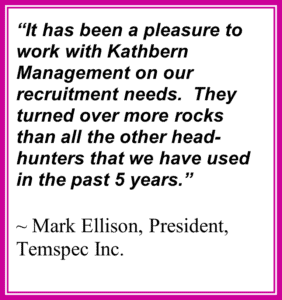(Reading Time: 7 minutes)
When to hire a recruiter and what to expect
Meet Paul and Cindy.
They are running a small business, making and selling heirloom baby quilts. It started out as a hobby for Cindy, who had made one for each of their children. When friends and family saw the quilts, they asked her to make one for their own children, for a fee. The business grew from there to selling them on Etsy, and the quilts are now being carried in several stores and sold online.
Cindy has several teams of people who hand-make the quilts, with each team overseen by a supervisor. Paul runs the business end, and Cindy oversees the creative side and makers. However, the business has grown so much lately, they need some help. Should they hire a recruiter?
Deciding whether to hire a recruiter: what position are you trying to fill?
It depends on the position. The lower level the job, typically the more applicants there will be.
So, if Paul and Cindy simply need an accountant, bookkeeper, office manager, or assistant, it’s probably best for them to do the recruiting themselves. They can post an ad on any of the job sites out there and will get a lot of hits. They will still have the problem of sorting through a lot of unsuitable applicants, but at least there will be applicants.
I did this recently myself.
 Kathbern is growing steadily, which means we will need some extra help soon. I posted an ad on a Saturday, and by Sunday morning I had 40 replies. It was enough that I turned off the ad, which hadn’t even run 24 hours.
Kathbern is growing steadily, which means we will need some extra help soon. I posted an ad on a Saturday, and by Sunday morning I had 40 replies. It was enough that I turned off the ad, which hadn’t even run 24 hours.
I had to sort through a bunch of junk replies, but I found six people that were reasonable. I talked to four or five of them, and added two to my bullpen, ready to call up if we need them. So, within 24 hours, I had some decent candidates.
If Paul and Cindy were to search for a straightforward role, like an accounts payable clerk or office manager, they’d have hundreds of results, and it would simply be a matter of filtering and sorting.
But what if they need something more specialized? If the role is very specific, highly technical, or more senior, they would need to prepare for a different type of search process. They might not be ready for that or have the time for that. That’s when it makes more sense to hire a recruiter.
This can even apply to larger companies with human resources departments too.
Posting a specialized role will still get results, but there will be a lot to dig through, and that takes time. And the replies may not be great, because with a role that’s senior or specialized, you’re probably looking for someone who is already working somewhere else and is not even looking to switch jobs. Internal HR may be limited in how much they can do, even with an internal recruiting group, because they may be more suited to recruiting for low-level positions that attract a high volume of candidates.
If we go back to Paul and Cindy, they are looking for a senior accountant who can help them with the books and do some strategic planning to help them grow the business. They need someone who can help manage the team, while fitting into the unique family-oriented culture they’ve created. They don’t have the time to sort through candidates, so they decide that it makes sense to hire a recruiter.
Decide what type of recruiter you want
The next step is to decide what kind of recruiter to hire.
There are two types: a contingency recruiter and non-contingency retained recruiter.
The contingency recruiter
A contingency recruiter is paid if and when they find a candidate that you hire. You’ll pay the contingency recruiter a certain percentage of whatever the candidate’s compensation is, once they are hired.
When you hire a contingency recruiter, they typically go through their database and send you a selection of candidates they think might be good. But they can lose interest pretty quickly if a company doesn’t move on any of the candidates. They can’t invest a lot of time in each search, because the risk of not getting compensated is too high.
The non-contingency retained recruiter
This is how we work.
A non-contingency retained recruiter is hired on an exclusive basis to fill a specific role. The fee is a percentage of the compensation for the role. A portion of the fee is paid upon signing the contractfor the search, then another portion after 30 days, and finally the balance is paid once the role has been filed.
Being exclusive is important. When no other recruiters are on the job except us, it means that we’re not competing for the same pool of candidates. In a contingency recruiting situation, there might be two or three other recruiters all running around town talking to the same people trying to get them on board, which is kind of madness.
With our approach, we are dedicated to getting the job done, no matter how long it takes.
When Cindy and Paul looked at the options, they decided to go with the latter choice, a non-contingency retained recruiter, because they realized it would be the best approach to finding the right candidate for their situation.
Recruiting with a non-contingency recruiter: understanding the process
When Paul and Cindy first reached out to the recruiter, they thought they knew what they needed. They had a list of responsibilities that needed to be met and believed an accountant would make the best match for the tasks at hand.
Define the role
However, as it turned out, they didn’t know what they needed.
 The more that they talked with the recruiter, the more they realized that what they really needed was a chief operating officer with a financial background. This person could help with developing a strategic plan and oversee the work of the manufacturing team, marketing, and the bookkeeper that they already have in place.
The more that they talked with the recruiter, the more they realized that what they really needed was a chief operating officer with a financial background. This person could help with developing a strategic plan and oversee the work of the manufacturing team, marketing, and the bookkeeper that they already have in place.
They also realized they needed an assistant, who could help them keep track of their calendar, plan their travel, and manage the smaller stuff. So they decided to fill the assistant role themselves, but work with a recruiter on finding a chief operating officer.
Paul and Cindy weren’t alone in needing some help to define the sort of role they need to fill. Approximately 50% of our clients change their understanding of what they need within a few weeks of talking to us. That’s partly why working with a non-contingency firm like us can be so helpful.
This is because entrepreneurs like Paul and Cindy might not have had much exposure to how a business operates outside of their own business. Paul had worked in sales at a large speaker company until moving into selling heirloom quilts, while Cindy had a few jobs in retail before getting pregnant, so they just weren’t aware of the different options.
A recruiter like us has seen all kinds of organizational structures, which means we can give good advice on what might work in each situation.
Set the right expectations
Another way that we help is by setting expectations, which can often differ from reality.
Take compensation, for example. It’s not unusual for clients to want too much for too little. So, we start by asking for a range that doesn’t commit them to anything.
It’s a bit like shopping for a house.
If I ask you what house price you want to pay, and you say $800,000, that doesn’t necessarily mean that you’ll end up with an $800,000 house, but it keeps us from shopping around for a $2 million or $400,000 house. We will show you what you can get in the $700,000 to $900,000 range, and you can decide if that’s what you want.
It’s the same on the people side. We’ll show you what you get for $80,000. You might learn that you need to increase your budget or be more creative about compensation. But we’ll work with you on that.
Ultimately, it is all about value. Will you receive more value from hiring an inexperienced but eager person for $70,000 or from a fully seasoned candidate who needs no training but requires $90,000?
There is no perfect candidate
Don’t limit your options even before you start.
It’s important to have an open mind. The chances of finding the exact profile that you’re looking for, down to very specific demographics, is remote.
 A lot of what we do is to suggest other options that will be a great fit, asking our clients to keep an open mind. For example, you might want to limit a sales job to people under 40, but (other than the discrimination issue) you’d be missing out on a lot of great candidates. We have a lot of experience and will only bring options that make sense for you.
A lot of what we do is to suggest other options that will be a great fit, asking our clients to keep an open mind. For example, you might want to limit a sales job to people under 40, but (other than the discrimination issue) you’d be missing out on a lot of great candidates. We have a lot of experience and will only bring options that make sense for you.
We recently had a contract to fill a role, where the client initially rejected the resumes we sent over out of hand because they didn’t match what the client thought they were looking for. We reminded the client that we’ve done this for a long time, and they haven’t done this as much as we have. We asked them to trust us and give the candidates 20 minutes on Zoom.
They did, and sure enough, they fell in love with one particular candidate and hired them. On paper, you could see why it wasn’t an exact fit. But we knew the candidate had a good background in general and had the right personality match for the client and the role.
Be prepared for a three-month process, at least
Signing the right candidate takes time. And it isn’t just for the search. It’s for the search, plus the meetings, negotiating the offer, and for the notice period that the candidate needs to provide their current employer. All of which we help with.
We generally tell clients that once they have signed with us, 90% of the time they will see the best three to four candidates available in the marketplace in three to five weeks. Those are a combination of candidates who are actively looking for a new opportunity and those who are working somewhere else that we have actively reached out to and shown them the opportunity from our client.
Finding suitable candidates (especially for specialized roles) is taking longer of late, but when we have a group of interesting candidates, you will receive a resume and interview report for each. Then you need to schedule time to meet them, and maybe bring them back for one or two additional meetings or for a plant tour, all which takes two to three weeks. And then, (assuming that there is an attractive candidate among the group) you put the offer together, which they must review with their lawyer—another two weeks. All in all, it’s a two to three-month process from signing with us to signing the right candidate.
Working with Kathbern Management
 We have a process that works quite well for our clients.
We have a process that works quite well for our clients.
First, we spend time refining the mandate. What exactly do you need? Then once you sign with us, we have an introductory meeting that’s about 30 minutes long during which we go through a long list of questions.
We’ll want to know all about the job, the compensation, what kind of benefits are included, perquisites, vacation time, etc. We want to know if there are companies that we should focus our search on or companies that we should avoid.
We also want to know if the search needs to be confidential, or if we can share the name of your company and the role. As I wrote in a previous blog post, it’s best to be as transparent as possible, because if we try to keep the search confidential there’s a risk that the search will leak. Moreover, we want to be able to share how great the company and the role are when talking to potential candidates about the role. We can’t do that if the search is confidential.
Then we go away and come up with an initial list, sorting through and screening first. We do an initial interview (typically on Zoom these days), and if we like the candidate, we prepare a one-page report for the client to review. The aim isn’t to regurgitate the resume, but to summarize their background, talk about their rationale for looking for a new job, where they live and whether it’s a reasonable commute, compensation expectations, and when they’d be available.
Then we send the client a list of potential candidates with these snapshots and resumes, and schedule interviews. And once the client decides on someone, we can help prepare an offer, based on the client’s standard approach or from a selection of draft offers that we can suggest.
We always recommend that the offer be conditional on the candidate providing acceptable references. We also recommend giving candidates no more than two or three days to review it with their lawyer and decide, because we want to avoid giving them an opportunity to shop it around for something better.
Once the candidate signs, we’ll check their references and produce a report for the client. If the client accepts the references, then they can waive the conditional nature of the offer and the offer is a legal agreement.
We give all our searches a six-month guarantee. If a candidate who was hired as a result of our search leaves within six months for whatever reason, we’ll do it all again for free.
Success for Paul and Cindy
In the end, Paul and Cindy realized they needed to fill not one but two roles: an assistant and a COO.
For the assistant, they advertised on a job site, and had 40 candidates within three days. Out of the 40, 10 were great candidates, and they decided to interview four that seemed to be right for them. Within three weeks, they had an assistant in place.
For the COO, they worked with a firm like Kathbern. The recruiter helped them create an effective job description and figured out an appropriate compensation package for the role. The recruiter brought them five candidates, three of which they weren’t sure about, but they interviewed all five, and ended up hiring a candidate they were initially skeptical about.
She was a little older than they initially wanted, but she came from a similar background, had built up her own business, then left to get an MBA and was currently working at a small business. So, she had the experience and skills to develop a strategic plan, as well as a keen understanding of entrepreneurial family businesses. It was a process that took about three months but resulted in finding exactly the person that Paul and Cindy needed.
Larry Smith is the founder and president of Kathbern Management, an executive search firm based in Toronto. Kathbern helps companies find the executives and senior managers who not only have the experience and credentials to fulfill their responsibilities, but also have the emotional and “fit” requirements that will enable them to be successful in a particular environment. Kathbern simplifies the process and, through deep research, brings more and better candidates forward than would ever be possible through a do-it-yourself passive advertising campaign.
Learn more at www.kathbern.com, or contact us today for a free consultation about your key person search. Follow us on LinkedIn, Facebook, and Twitter.

